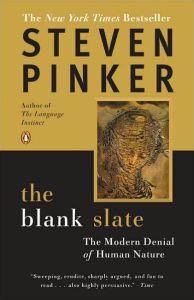Join getAbstract to access the summary!

Join getAbstract to access the summary!
Steven Pinker
The Blank Slate
The Modern Denial of Human Nature
Penguin, 2003
What's inside?
Provocative exploration and exposé of human nature and attempts to suppress the truth about it
Recommendation
This book covers a lot of ground: philosophy, genetics, cognition, sociology and academic infighting. Steven Pinker, writing with persuasiveness and craft, shows why the doctrine of the “Blank Slate” became so important to 20th century intellectuals that they were willing to lie, cheat, libel and even threaten those who dissented. Yet, the dissenters were right. Given what science now knows of genetics, the idea that people are blank slates at birth is simply untenable. getAbstract finds that the author, despite a few hints of personal prejudices (ah, there’s human nature again), does an excellent job of grappling with enormously challenging subjects.
Summary
About the Author
Steven Pinker is a psychology professor at Harvard University. His research on visual cognition and the psychology of language earned prizes from the National Academy of Sciences and the American Psychological Association, which gave The Blank Slate two major book awards.




















Comment on this summary